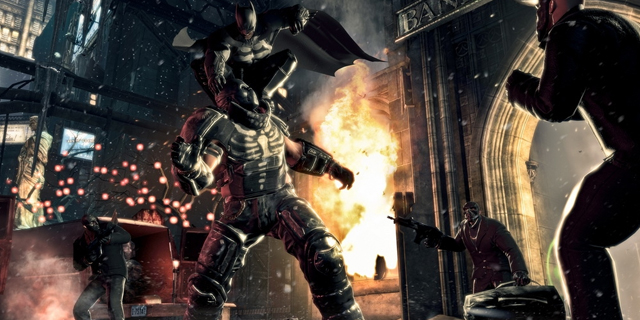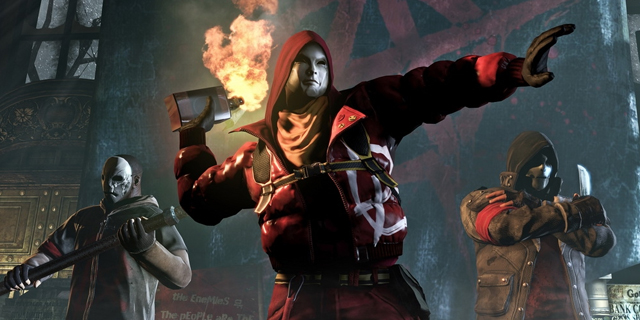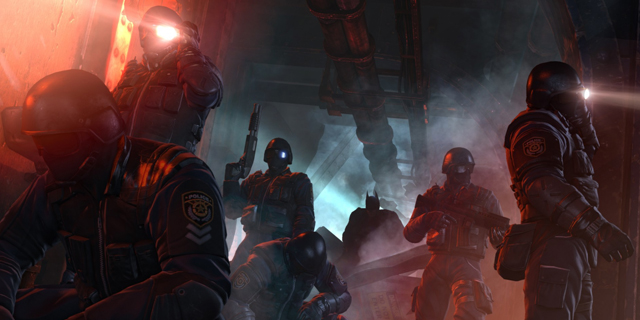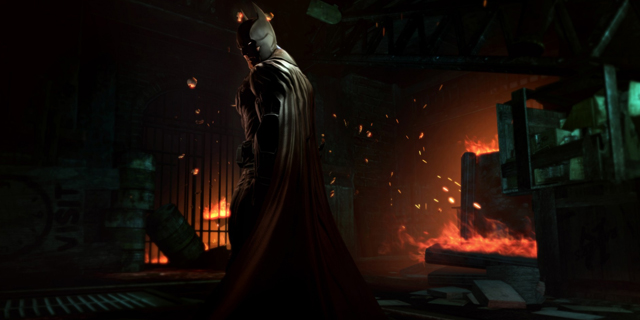
The Dark Knight has come a long way since the days of the first Batman games. It had gotten so bad that any fans of the character were thankful for even a mediocre game. Thankfully, 2009’s Batman: Arkham Asylum changed everything for both Batman and comic-based games in general. Both it and its follow-up, Arkham City, are considered by many to be two of the best superhero games around.
Now, with Batman: Arkham Origins, a new developer is brought on to tell a prequel story all about Batman’s first encounters with some of his most famous villains. After two stellar titles, expectations are high; unfortunately, the game fails to meet those expectations in many ways.
We’re all familiar with the origin story of Batman, at least vaguely, so the set-up is less about Bruce Wayne becoming Batman and more about how he became known to Gotham City as a force to be reckoned with. As such, he has first encounters with many of his most famous adversaries, including The Joker. The story heads into some very predictable directions often, with a particular twist early on turning a unique take on Batman’s history into something less exciting as a result. That being said, it’s a solid tale, one that goes in some fascinating directions once it gets past those moments and finds its footing.

Forced progression
If I want to upgrade combat abilities at the expense of armor, like I could in the last two Arkham games, let me. If that means I die, then let me deal with the consequences of my actions. Forcing me to buy armor upgrades just makes me less excited to level up, because I’m not making exciting choices and obtaining things that make the game more fun. I’d rather get all the gadgets and have to retry a few rooms, instead of living forever without the fun toys. – Justin Last
If you’ve played Arkham City, you know exactly what to expect. The game plays almost exactly identically, complete with an open city to explore and plenty of side content, courtesy of some lesser-known Batman villains. Traveling around the city as Batman is still a blast, and being able to switch from traversal to combat in a matter of seconds remains as exciting as ever. The free-flow combat, a trademark of the series, is just as smooth and intense as you remember, and the stealth segments continue to make sneaking up on expecting henchmen thrilling. In short, everything you know and love about the previous two games is intact and is exactly how you remember it.
That is, unfortunately, the game’s major drawback as well. The Arkham mechanics are undoubtedly amazing, yet there isn’t enough new here to make them feel fresh again. The small tweaks to combat and stealth plus the open-world made Arkham City feel like a step up from Asylum, yet there isn’t that one new, exciting feature in Origins. The story is different, sure, and you encounter some new challenges along the way, yet a once impressive formula is beginning to feel stale. Sure, Batman has a few new gadgets to mess with, but none of them add anything remarkably new to the gameplay and also feel out of place considering, well, the game’s a prequel.
There are some smart changes to other, less memorable sections from previous games. Detective Vision, the signature mode that allows you to see enemies and other interactive environmental objects, is still here, complete with segments designed specifically to investigate crimes using it. These crime scene sections are more fleshed out this time around, allowing you to reconstruct the crime itself once you gather enough information in order to piece more of it together. It still feels like you’re being led by the hand during some moments, yet these small changes turn these routine segments into something more enjoyable.

Fast-travel woes
All large open-world games need fast-travel. What they don’t need is to lock it behind side objectives. By the time I’ve completed the side objectives, I need to go there less often. Besides, it’s not like Batman is feeding the meter and turning on the alarm. He’s jumping out of the Batwing and probably landing on a mook’s face. Puzzles are fine for upgrading combat abilities, obtaining extra armor or just completing your save file, but don’t make it less convenient to complete side objectives and then reward me with the ability to instantly return now that I have less reason to. – Justin Last
While the boss fights in City were leagues better than Asylum’s, the team at WB Montreal managed to step them up even more this time around. These encounters are all unique and utilize the combat in fresh ways while remaining in-line with what you would expect from the game’s mechanics. This allows you to both use what you’ve learned while also sharpening your skills for future fights.
For example, an early boss fight with Deathstroke, a villain who matches Batman’s physical skills almost perfectly, quickly teaches you that hammering the counter button won’t work during these fights. The fight keeps you on your feet and is almost entirely about timing, forcing you to pay attention to his attacks while also remaining on the offensive. Fights like these are exactly what the franchise needed and provided me with some of the game’s best moments.
Even with the once-sharp mechanics beginning to dull, the game doesn’t feel like an exact copy of the previous games thanks to its improvements in some smaller areas. This alone would make it a worthy follow-up while also demonstrating exactly what needs to improve, yet there are some unfortunate issues that hold it back even more.

When new isn’t new
It’s hard to make a prequel feel fresh. You can’t use freeze grenades, because Batman invented those in the second game. So what do you do? Palette-swap them, call them glue grenades, realize glue grenades are stupid and never speak of them again. And the shock gloves are just a recycle from Batman: Arkham City Armored Edition’s Battle Armored Tech (BAT) suit on the Wii U. Even what’s new here to PC, 360 and PS3 players isn’t really new. – Justin Last
The game is technical mess, at least on some platforms. Not only are there issues with frame rate, both during certain combat encounters and while traversing the city, the game hard-locked my 360 several times while playing. Sometimes this happened while I was merely traveling around the city, others during combat, and, most frequently, while the game was loading. It eventually led to the corruption of my save file, causing me to lose at least six hours of progress. Even after starting over, the issues remain and were consistent throughout my experience. These problems turned a solid sequel into a game that might not even be worth bothering with, at least not at launch.
New to the series and entirely separate from the single-player content is competitive multiplayer. This mode pits two rival gangs against each other with a third team comprised of Batman and Robin set out to stop their schemes. Each gang has to capture control points while also watching out for Batman and Robin, who use their skills in an attempt to stop them. This turns the Arkham formula into a rather generic third-person shooter when playing as the gangs and, when controlling Batman or Robin, it becomes a bit tedious as you attempt to take out said gangs. Conceptually, it’s a fine idea, but the execution is seriously lacking. Just ignore this mode entirely.

For a game I never had high hopes for to begin with, Batman: Arkham Origins manages to disappoint. Sure, it’s still a fun time, and will keep fans of the series mostly entertained due to its still-amazing core mechanics, but it does little to improve the formula. It feels like an Arkham City expansion more than a full release. That, combined with the many serious technical issues, hold this back from achieving the previous games’ level of excellence.
Pros: Entertaining mechanics, exciting boss battles, (mostly) enjoyable story
Cons: Increasingly-stale formula, forgettable multiplayer, technical problems



















